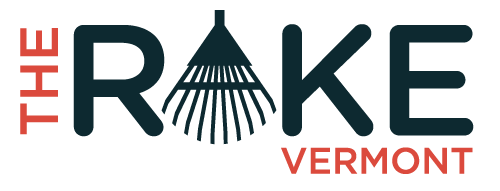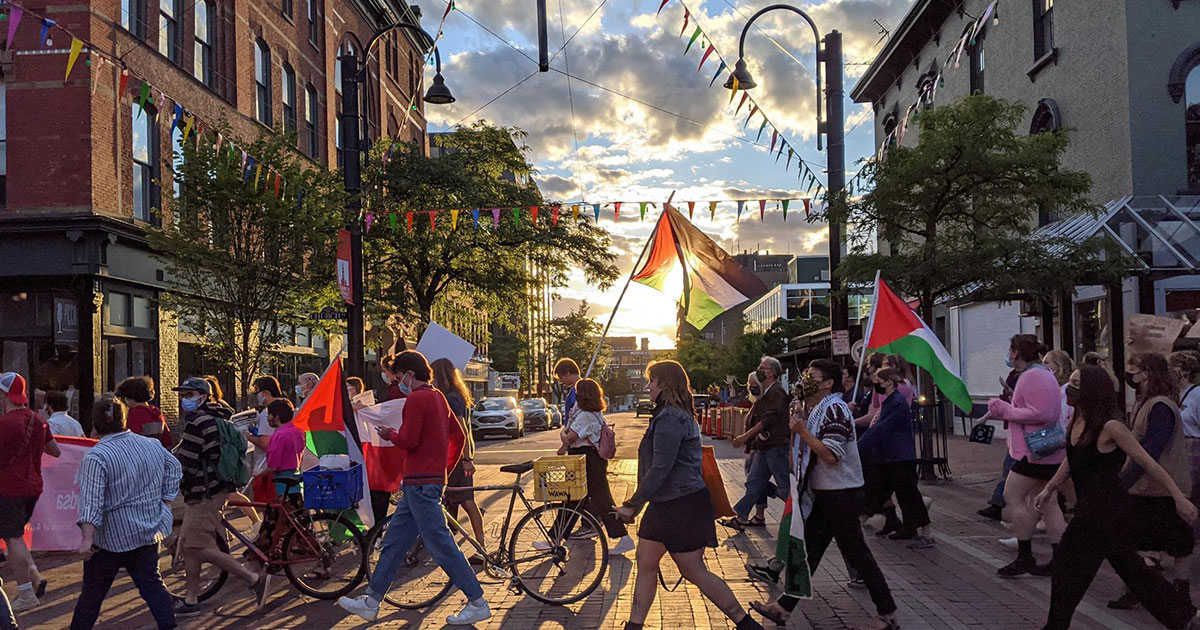The Burlington City Council on Monday night was set to vote on the “Resolution Calling for Justice and a Peaceful end to Palestine and Israel Conflict.”
The vote never happened.
What Was in the Resolution, and Who Supported it?
The non-binding resolution, introduced by Councilor Ali Dieng, provides a brief overview of the Israeli government’s actions in Gaza and the West Bank, including military occupation, air and artillery attacks, illegal settlements, and denying Palestinians the basic means of survival. The resolution also notes that the organizations Human Rights Watch, B’tselem, and Yesh Din have determined that the Israeli government is committing the crime of apartheid.
The resolution commits the council to “express its solidarity with the Palestinian people, condemns anti-boycott legislation, and endorses the Palestinian-led Boycott, Divestment and Sanctions movement.” It also calls for the halting of U.S. military aid to Israel and for “both Israelis and Palestinians to coexist and peacefully live together.”
At press time, twenty-seven state and local organizations had endorsed the resolution. One Burlington Tenants Union organizer wrote to The Rake Vermont, “The genocide and forcible removal of Palestinians from their homes is being driven by the same system that committed genocide against indigenous people in what’s now Vermont and the US, and that is now forcing tenants all across Burlington out of their homes. The right to housing and safety is universal, regardless of where you live.”
At a rally before the city council meeting, Enrique Balcazar, an organizer with Migrant Justice, linked the struggles immigrants have here in Vermont with the struggles of Palestinians. Through an interpreter, Balcazar said, “I’m also from a people divided by a wall. It’s been ten years since I’ve been able to see my mother, ten years since I’ve been separated from my family. The same is happening to the people of Palestine. I say the people of Palestine have the right — they must have the right — of return so that they can be united with their families, with their land, with their homes, with their people.”
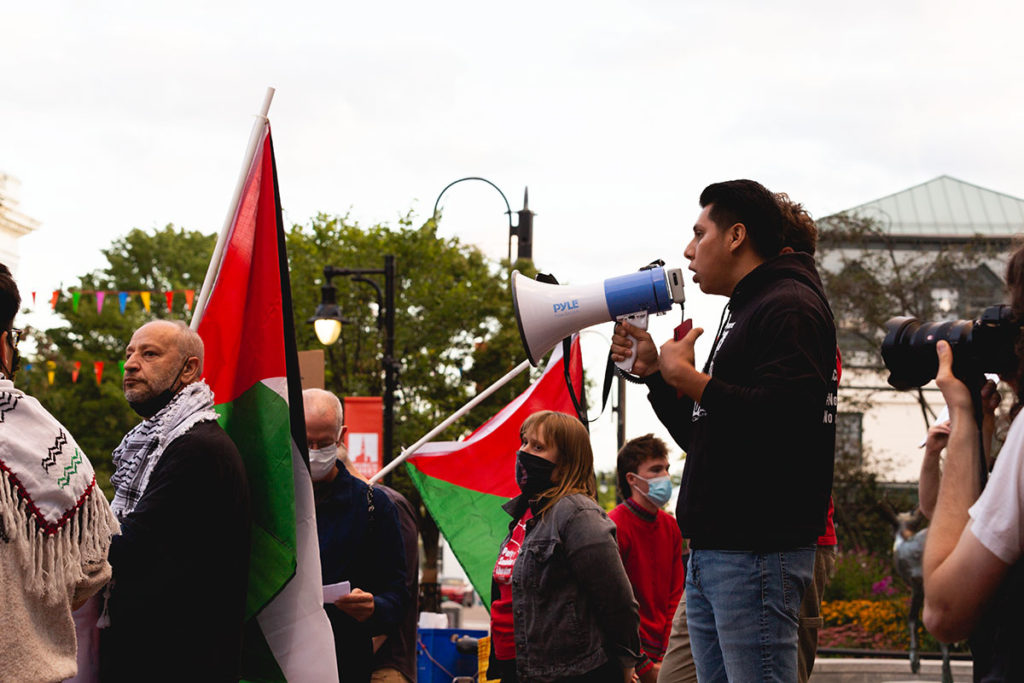
A Council Under Pressure
The public comment period during the meeting was energetic, lasting over two hours, with the full meeting stretching on past midnight. Dozens of people spoke in favor of and against the resolution, with the council voting to extend the time allotted to public comment to accommodate everyone who signed up to speak.
A vote in favor of the measure would have marked Burlington as the first city in the United States to adopt a pro-BDS resolution. When the moment came, however, Councilor Dieng instead made a motion to withdraw the resolution, surprising many supporters. This new motion would avoid an up-or-down vote on the resolution itself, and allow it to be re-submitted at a later date in its present or a revised form.
In Dieng’s remarks after making the motion, he began by defending the language of the resolution and explained the process by which it arrived at the council floor. Dieng said the resolution had previously gone through public comment and deliberations in the council’s Racial Equity, Inclusion, & Belonging Committee, which then voted on August 17 to send it to the full council for a final vote.
Dieng said he sent a copy of the resolution to Mayor Weinberger’s office on August 20 “in order to receive feedback,” but received no reply. (The mayor’s office did not respond to requests for comment.) His wait for a response from the mayor was Dieng’s explanation for why the resolution was presented to the full council on September 13 and not earlier. Opponents of the resolution, including Mayor Weinberger in his very first statement on the matter earlier that day, had objected to it being considered at a meeting between the Jewish holidays of Rosh Hashanah (September 6-8) and Yom Kippur (September 15-16).
An Avalanche of Emails
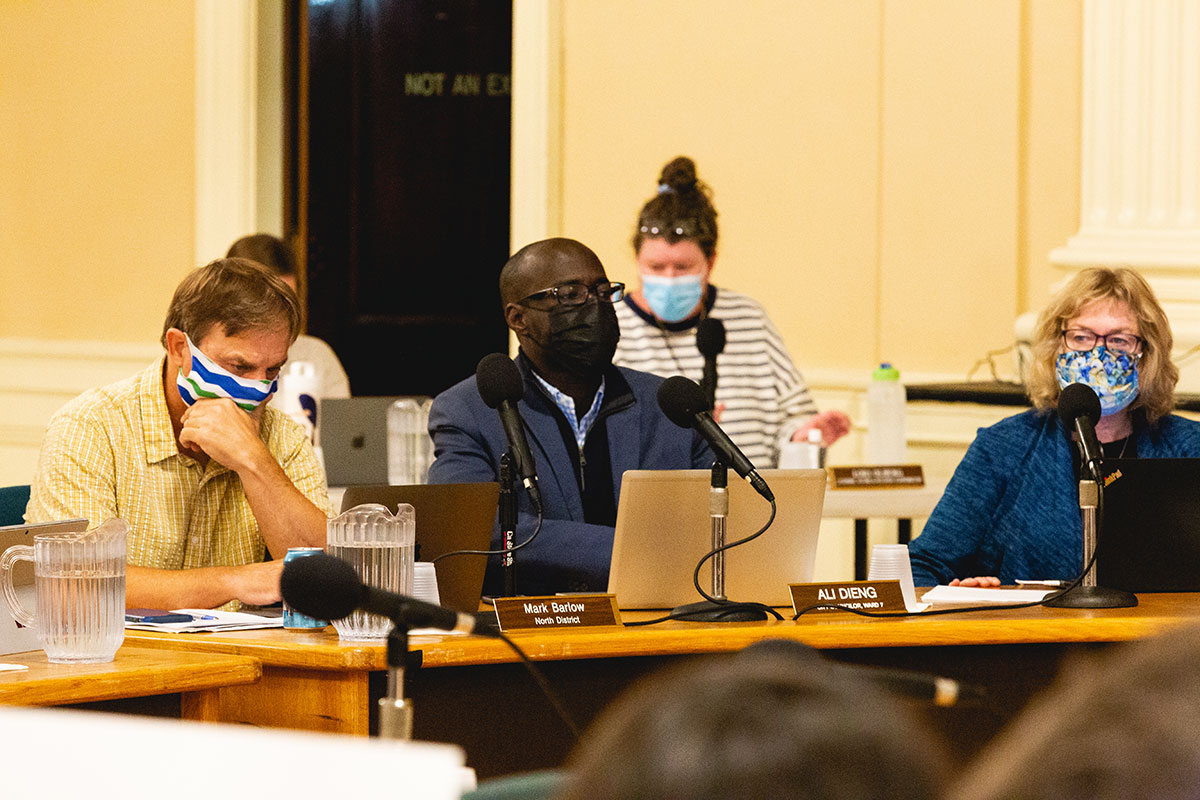
Several councilors mentioned the significant volume of emails and social media posts directed at them, the vast majority urging them to vote no. “In the past two weeks we have received a substantial amount of pre-written emails — most of them,” Dieng said. “Emails from all over the nation.”
This is likely due to the work of national organizations that engaged in a sudden flurry of activity less than five days before the vote. On Thursday, September 9 the Israeli-American Civic Action Network created an online email petition to the mayor and city council. On Friday, September 10 the Anti-Defamation League’s New England branch promoted an anonymous one-page petition site, Burlington Against BDS, that was first brought online that day. On Saturday, September 11 the Israeli-American Coalition for Action created an online petition that accompanied what they described later as an “email campaign” and phone calls to city councilors.
At least one organization used paid social media posts. A group named “BDS Report,” based in Paramus, New Jersey, bought a Facebook ad from September 10-14 urging people to tell the councilors to “reject BDS.” The ad was seen more than 100,000 times and had a potential reach of 100,000 to 500,000 people. (For reference, the City of Burlington has a total population of roughly 42,000.) More than a quarter of those who saw the ads were located in New York State.
The social media messages and emails followed a similar rhetorical line: stating the resolution was one-sided, decrying BDS as inherently antisemitic, and that BDS proponents seek the demonization and destruction of Israel. No evidence was offered. These sentiments were echoed by four local rabbis, who published an op-ed on September 9 in VTDigger. The authors warned, “This resolution serves as a flash point that divides us further, rather than advancing an agenda of peace.”
Liz Blum doesn’t see it that way. Blum is a member of Jewish Voice for Peace’s Vermont and New Hampshire chapter that co-sponsored the resolution. She said that on matters of moral importance some disagreement is inevitable, but “it won’t divide people. It will drive people to more equality. Like Bernie said, you don’t start with everyone agreeing. You have to start discussions.”
After naming some of the national organizations who met with him, Dieng concluded that his resolution needed to include statements opposing antisemitism. “What strikes me the most is how I learned about antisemitism, and how it affects members of our society,” Dieng said. “This resolution, from my perspective, is not ready for the City of Burlington to vote on it tonight.” In its place Dieng suggested more public dialogue and education, including a standing agenda item for every Racial Equity, Inclusion, & Belonging Committee meeting.
It was the sudden wave of opposition activity that changed the calculus for the resolution’s backers, once confident of a clear majority vote in the council. “We had seven votes,” said Wafic Faour, whose organization Vermonters for Justice in Palestine was the leading proponent of the resolution. Faour, a longtime Vermont resident born in a Palestinian refugee camp, had worked closely with coalition partners and members of the city’s Progressive Party councilors. It was the new highly-charged environment, he said, that forced a shift in tactics.
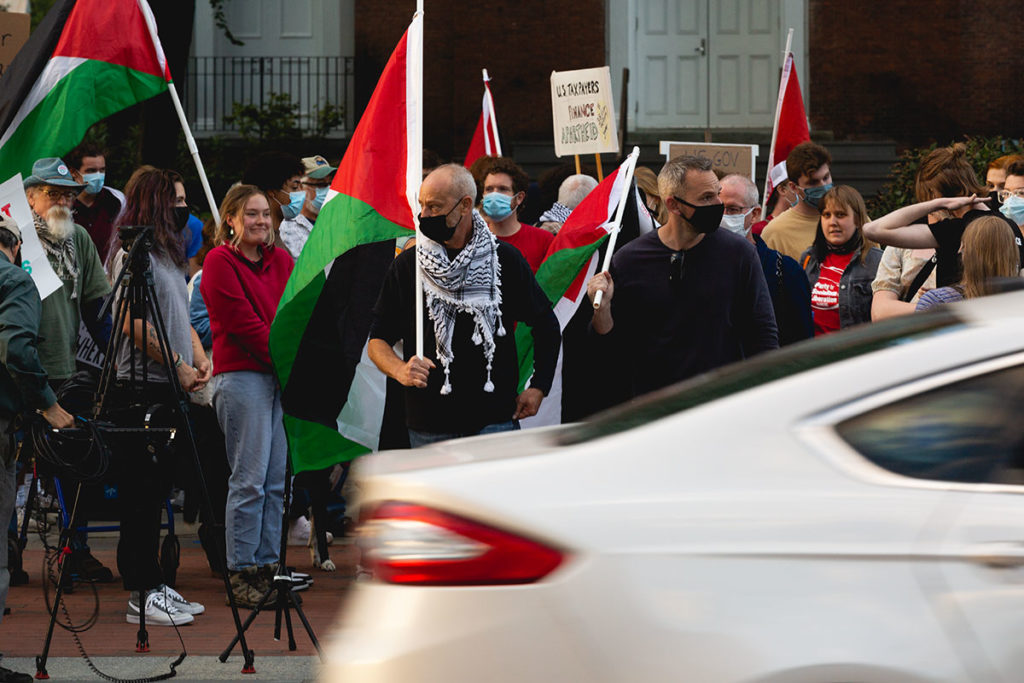
A Stalemate of Sorts
Faour said Dieng had been pressured by other councilors to pull the resolution from the agenda before the start of the meeting, which would have precluded any formal debate on the issue. (Dieng did not respond to a request for comment.) By Dieng making a motion to withdraw during the meeting, debate was able to take place, despite repeated procedural objections by Councilor Joan Shannon. Democrats, led in the discussion by Councilor Karen Paul, now argued the motion to withdraw wasn’t enough: they wanted the withdrawal motion to fail so they could then vote to formally reject the resolution, which would prevent it from being presented before the council in the future. “I will reluctantly vote against the motion to withdraw,” Councilor Paul said, “because I just don’t want to see us — I want to see us move forward, I don’t want to be back here, in another two weeks or two months having this conversation again.”
Dieng and Progressive councilors prevailed, successfully withdrawing the resolution on a 6-5 vote. Councilor Perri Freeman was absent.
“By pulling [the resolution] out, it helped the council members who support the resolution not to vote in a charged atmosphere without prior education on the subject, and on the difference between our position against Israeli occupation policy and antisemitism,” Faour said. “This is a subject we have to educate the public and council members about.”
Despite the outcome in city hall, public opinion and political sensibilities in Vermont and the United States do seem to be shifting. The Israeli government’s actions this past May, an aggressive bombing campaign against Gaza following evictions of Palestinian families from their homes in the Sheikh Jarrah neighborhood of East Jerusalem, galvanized protests across the U.S., including marches of hundreds of people in Burlington and nearby towns. “I think there’s much more consciousness about it now because Israel has behaved so badly,” said Liz Blum. Even before May, Gallup recorded historic drops in U.S. public support for the Israeli state among liberals and those under 35.
“We succeeded in putting the debate on the table,” Faour said. “They tried to pull the resolution before the debate would take place, and they lost.”
Patrick is a writer and organizer based in northern Vermont. He is on the editorial collective for The Rake Vermont.
